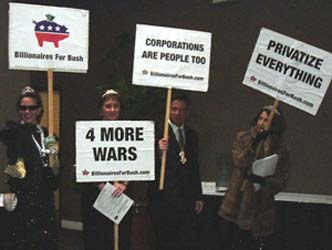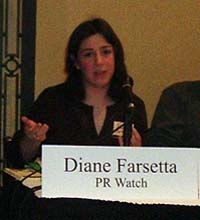"True Spin": An Oxymoron or a Lofty Goal?
"Officials from giant corporations meet all the time to share their latest and greatest PR strategies," read the conference website. "Now it's our turn."
 On February 2 and 3, some 180 people attended the True Spin Conference in Denver, Colorado, which was billed as "a PR conference for progressives." The event was organized by CauseCommunications, a small Denver PR firm whose clients have included Ben Cohen's Business Leaders for Sensible Priorities, Winona LaDuke's Honor the Earth, and The Progressive magazine.
On February 2 and 3, some 180 people attended the True Spin Conference in Denver, Colorado, which was billed as "a PR conference for progressives." The event was organized by CauseCommunications, a small Denver PR firm whose clients have included Ben Cohen's Business Leaders for Sensible Priorities, Winona LaDuke's Honor the Earth, and The Progressive magazine.
As a representative of the Center for Media and Democracy (CMD), I found myself generally agreeing on the ends, but sometimes disagreeing on the means, of conference attendees' media work.
Some Words of Wisdom
Much of the True Spin conference was devoted to honing media skills. Often-repeated advice included: Build personal relationships with reporters. Be succinct in making your main points, but have supporting information at hand. Engage your audience with personal stories. Don't repeat your opponents' arguments. And practice giving interviews to improve your presentation.
One of my favorite conference moments came early the first day, when Alternative Radio's David Barsamian expressed concern at the ever-increasing consolidation of media ownership, which, he warned, has "very deleterious effects on the workings and the spirit of our democracy." He added, "No matter how well meaning they might be," the handful of corporations that own most mainstream U.S. media outlets "simply do not" cover controversial topics or include "a range of opinions."
The next speaker on the panel, from the local Clear Channel radio station, started off by saying, "I'm going to take a little bit different tack." He continued, "Part of our business is to create audience, to be able to have enough audience to be able to sell ads to support what we do."
The third panel speaker, from the local ABC TV affiliate, complained, "I hate when people say television dumbs down the news. ... Why is keeping something simple assumed to be dumbing it down?" But later, he admitted that television "can't handle multi-dimensional issues."
At several times during the conference, presenters told horror stories about how overworked reporters are and how downsized U.S. newsrooms have become. These points were made to impress upon the audience the need to be succinct, timely, accurate and polite in their communications with reporters. It's exactly this situation that PR firms and their clients exploit to place fake news on television and radio, and in newspapers and magazines.
 The Denver ABC reporter said, "I'm one of five reporters today, which we can talk about whether that's good or not. I'm one of five general assignment reporters on staff today, and I have a slot I have to fill, in at least one newscast." A former television reporter stressed, "I don't like the term spoon fed, but journalists are busy people. They don't have a lot of time -- especially in today's world, especially in television. You will find people who are not writing a big story a week; they are writing two or three stories a day." A former print reporter, referring to the wholesale adoption of a press release he had written for a nonprofit group, shared, "I will admit that I never expected that my first piece in the Washington Post would have all of my quotes and all of my arguments, but not my byline."
The Denver ABC reporter said, "I'm one of five reporters today, which we can talk about whether that's good or not. I'm one of five general assignment reporters on staff today, and I have a slot I have to fill, in at least one newscast." A former television reporter stressed, "I don't like the term spoon fed, but journalists are busy people. They don't have a lot of time -- especially in today's world, especially in television. You will find people who are not writing a big story a week; they are writing two or three stories a day." A former print reporter, referring to the wholesale adoption of a press release he had written for a nonprofit group, shared, "I will admit that I never expected that my first piece in the Washington Post would have all of my quotes and all of my arguments, but not my byline."
Is There "Good" Fake News?
In my presentation, I cautioned against progressive groups trying to replicate the U.S. political right's approach to communications (which David Brock detailed in "The Republican Noise Machine" and CMD's John Stauber and Sheldon Rampton addressed in "Banana Republicans"). While effective in the short term, many of these tactics undermine the integrity of news media and the quality of public debates -- both of which are integral to achieving progressive social change.
After describing recent examples of obviously deceptive tactics -- PR firms engaging in pay for play, creating "astroturf" groups, undermining legitimate opposition, and otherwise giving misleading impressions of their (usually corporate) clients -- I turned to fake news. Unfortunately, more progressive groups seem to be using audio news releases (ANRs) and video news releases (VNRs). For example, the U.S. Green Party issued several VNRs in response to Bush's State of the Union address this year.
According to academic studies, industry monitoring, and anecdotes from media personnel -- in fact, according to all accounts, with the exception of PR executives' Senate testimony -- television newsrooms airing VNRs rarely disclose their source to news audiences. I explained that, in order to honor the public's right to know where its "news" really comes from, CMD calls for mandated disclosure of all broadcast material provided by third parties.
 I urged progressive groups putting out ANRs or VNRs to ensure the public's right to know by including disclosures within the broadcast material itself. In the case of VNRs, this could be done by displaying the organization's logo and / or the words "footage provided by X" throughout the video. Their groups' goals are lofty and important, I told the audience, but the PR tactics used to further those goals must also be principled.
I urged progressive groups putting out ANRs or VNRs to ensure the public's right to know by including disclosures within the broadcast material itself. In the case of VNRs, this could be done by displaying the organization's logo and / or the words "footage provided by X" throughout the video. Their groups' goals are lofty and important, I told the audience, but the PR tactics used to further those goals must also be principled.
The audience's response was polite but unenthusiastic -- perhaps because they weren't expecting media ethics to be addressed in a workshop titled "Do Progressives Suck at PR?" The other panelists, two media critics writing for print outlets and the director of a public interest media center, mostly focused on the do's and don'ts of contacting reporters. As the first panel speaker, though, I was able to nudge the discussion slightly towards potential clashes between progressive values and PR tactics.
In one-on-one conversations, a few conference attendees said that their groups use VNRs. "But we put out the good VNRs," one videographer told me. When I responded, "The only good VNR is a labeled one," he countered, "But the TV stations like to pretend it's their own reporting." He's right -- but so is CMD.
Progressive groups desperately trying to publicize important information, analyses and policy proposals through compromised news media do have to make tough choices. But there are options -- including working with independent, alternative media -- that received little attention at the conference. (To be fair, culture jamming and street theater to creatively capture media attention and reframe issues were discussed -- and demonstrated by the talented Denver chapters of Billionaires for Bush and the Raging Grannies.)
Challenges Ahead
During the conference's last keynote presentation, an African-American man challenged the organizers and other attendees to ensure that future meetings would draw a more diverse crowd. "I won a bet with my wife," he said, "that I would be the only brother here." (There were a few African-American women and other people of color present, but the event was overwhelmingly white.)
Racial diversity is not just the nice or morally right thing to do, he said. "We're not going to win" until progressive groups representing a wide range of communities and experiences are all meeting together.
In addition to seriously considering the forces that alienate and disempower people based on their race and / or economic class, progressive groups need to consider the forces that pollute the information environment. Does the short-term gain from using unlabeled VNRs or ANRs outweigh the damage done to the credibility of news outlets? Does the buzz from running provocative ads in the prestige press justify funneling considerable resources -- which could be used to strengthen alternative media -- to media conglomerates that are often part of the problem?
Much like life, media ethics are complex. These questions can't be answered with a black-or-white, or one-size-fits-all, approach. The fact that the True Spin Conference organizers asked CMD to present suggests these issues are on their radar screen. Hopefully, future events and other forums will explore these questions in more depth.





Comments
News
All the same it is not necessary to forget that reporters is people too and to them as it is necessary to earn money and to feed the family. And concerning news - it became seems to me that all of them recently somehow more rigidly. Such impression that when you sit to look news as though you go on film of horrors, and the most severe for last some years. Everywhere murders, violence, blood. It can promotes increase in aggression of citizens, can plays on a hand to politics, I do not know.
With best wishes, "Russian Post"
We are always .online for help
[http://www.xnetdot.com Xnet RusPost]
Amen
To paraphrase Emma Goldman: If I can't determine the origin of your press release, I don't want to be part of your revolution.
-- esp
True spin?
I strongly agree with regard to rejecting the use of PR tactics to further progressive causes. If progressive social change is to be accomplished by 'understanding and manipulating the group mind' and thus controlling the 'bewildered herd', as two of PR's progenitors put it, we ought to view it no differently than when Republicans, or anyone else, use these methods to further their agendas- that is, an exercise in hypocrisy and deceit.
Of course, we have to be careful what we call 'progressive' in the first place- seems a lot of it consists of folks whose message is basically, "George Bush is a bad, bad man (with the implicit postscript: so go vote for a Democrat instead, because they oppose his policies)." That's a gross misuse of the term progressive as far as I'm concerned, and I'd be very skeptical of any meeting of so-called progressives asking the question "do progressives suck at PR?" and not very quickly reaching the conclusion "yes, intentionally so, because progressives ought not be focused on how to better propagandize the public."